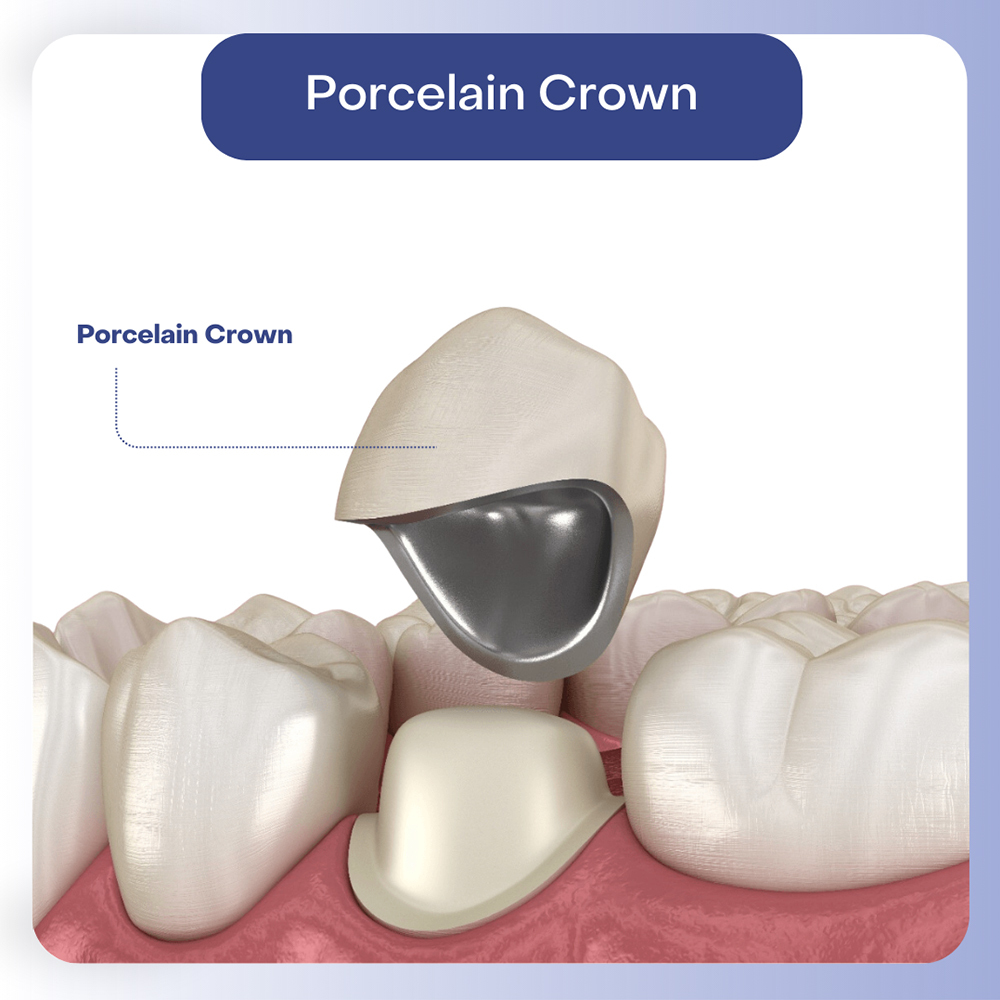Table of contents
Dental crowns cover a tooth entirely. Crowns are necessary when a tooth is weakened or missing a large part of its original structure. Crowns are also called dental caps. There is no difference between a crown, a dental cap, or a tooth cap, as all are the same tooth restoration.
Crowns can be made from various materials, but most nowadays are made from porcelain. A well-fabricated and properly cared-for porcelain crown can last ten years or longer.
 A porcelain crown is a restoration designed to fit over the entire tooth. During preparation, our dentist in Hackensack will need to remove some tooth material. This is to ensure there is enough room for the porcelain crown to fit securely and comfortably. Once made, the porcelain crown is bonded permanently onto the tooth.
A porcelain crown is a restoration designed to fit over the entire tooth. During preparation, our dentist in Hackensack will need to remove some tooth material. This is to ensure there is enough room for the porcelain crown to fit securely and comfortably. Once made, the porcelain crown is bonded permanently onto the tooth.
In addition to protecting a damaged tooth, crowns can cover teeth that have received root canal treatment or restore dental implants. They also form part of a dental bridge.
We may recommend you have a tooth crown in the following situations.
Several different types of porcelain can be used to make a crown for a tooth. Options include porcelain fused to metal crowns, pressable ceramic crowns, and same-day crowns.
Porcelain fused to metal crowns (PFMs) have been around for decades and are reliable and durable. A PFM has a thin metal substructure that is covered with porcelain. The result is a crown that looks reasonably natural, and the color matches the shade of your natural teeth.
PFM crowns can be used to restore front and back teeth. They are an affordable porcelain crown and are quite strong. A PFM crown can be an excellent choice for restoring back teeth, where aesthetics may be less important. This is because more modern all-porcelain options can result in better aesthetics and be preferable for a front tooth crown.
There are several drawbacks to PFM crowns, including the following.
Pressable ceramic crowns like e.max can produce excellent aesthetics. A solid block of porcelain is heated until it becomes flowable and then pressed under vacuum. Porcelain can then be added to the crown to characterize and perfect it further.
These crowns have high translucency, closely replicating a natural tooth by mimicking tooth enamel closely. Pressable crowns are a good choice for a front crown for a tooth. They can also restore back teeth as the material is reasonably strong.
Thanks to modern CAD/CAM technology, we can make and fit beautiful porcelain crowns on the same day. My New Jersey Dentist has an on-site CEREC® milling machine.
CEREC crowns are precision-made and are milled from a solid block of pre-shaded porcelain. Because they use digital technology, the fit is extremely good. The ceramic used to create them is high-quality, and each crown is hand-finished by our skilled technicians in our on-site dental laboratory. The result is a beautiful new crown ready to fit on the same day.
Instead of a conventional dental impression, we scan the prepared tooth using a tiny handheld digital camera. It takes thousands of images that create a 3-D digital dental impression. Our dentist uses sophisticated software to design your new crown using this digital dental impression. Once ready, the design is transmitted to our on-site milling machine. It doesn’t take long for the machine to mill the new crown precisely.
Yes, as the all-ceramic material closely replicates natural tooth enamel, similarly transmitting light, it looks entirely natural. We keep a wide choice of shades in stock, and your crown is custom-finished before fitting.
A CEREC crown eliminates needing a temporary crown and a second dental appointment.
Most people are suitable for same-day crowns, but we may suggest traditional crowns in certain circumstances. For example, if you require multiple crowns or other dental restorations, such as bridges or veneers, hand-crafting them in our dental laboratory could produce better results as we can spend time accurately matching the restorations as different porcelains may be used for each.
There are several steps to having the new porcelain crown, so you will need at least two visits to our dental office for treatment unless you have a same-day crown.
Our dentist must reshape the tooth to create enough room for your new crown. Local anesthesia ensures your tooth feels comfortable during this procedure.
Once prepared, we take a detailed dental impression. Our dentist will choose a suitable shade of porcelain, and we may also take photographs to assist our dental technicians in custom-creating your dental crown.
A temporary crown is fitted to protect your prepared tooth. Usually, these are made from an acrylic material. Because they are more fragile and only bonded with temporary cement, you need to take care when biting and chewing food, as temporary crowns are more easily dislodged and damaged.
It usually takes two weeks to make your new crown, and once ready, you return to our dental office to have it fitted. Our best-rated dentist will remove your temporary crown and check the fit, shade, and overall shape of the crown. You will approve its appearance before we bond it in place using strong dental cement.
Immediately after your new crown is fitted, you can resume normal activities, and there is no need for any downtime. However, it’s normal for any new restoration to feel slightly more sensitive, especially to hot and cold foods and beverages. The gum around the crown may feel slightly sore or tender for a few days afterward.
Please get in touch with us if your crown doesn’t feel comfortable after a couple of days. Sometimes, it is necessary to make some minor adjustments, for example, to the biting surface of a tooth, to get it to fit accurately.
There are very few risks and disadvantages to having this treatment. It is important to realize it is irreversible because some natural tooth structure must be removed.
If a porcelain crown isn’t made accurately, it can leak around the gum margin, trapping bacteria and leading to tooth infections and deep decay. We take extensive precautions to ensure this doesn’t happen and that each crown is made to fit precisely and tightly over the tooth.
It is easy to look after a porcelain crown. Brush it twice daily and floss around it each day exactly like a natural tooth. Treat it as gently as your real teeth, avoiding any hard or crunchy foods that could damage it. Regular dental exams and cleanings will help protect and preserve your crown, helping it to last longer.
You can expect a porcelain crown to last ten years or longer with the right care. Porcelain is stain-resistant, so your new tooth should look good for years to come.
Eventually, it will need to be replaced. We will check its condition and fit during every dental exam. As restorations age, they can start to leak around the margins. Replacing restorations in a timely manner helps ensure the tooth underneath remains protected.
The cost varies according to the material chosen. The most cost-effective option is likely a PFM, while pressable and same-day crowns cost more due to using newer and more advanced technologies and materials.
Dental insurance should cover at least part of the cost of a dental crown, provided it is used for restorative purposes and is necessary to protect your oral health. The costs might not be covered if you need a dental crown for cosmetic purposes, such as to cover a stained tooth.
Modern porcelain crowns can look amazing and will feel natural and comfortable. They can quickly restore your ability to smile, talk, and eat without embarrassment or pain, sometimes even on the same day.
If you have a failing, broken, or uncomfortable tooth, please come and see us. As with any dental care, the sooner we can diagnose and treat the problem, the more likely we can restore your tooth with a simple solution like crowns for teeth.

My name is Victoria Kushensky. I am a general dentist dedicated to remaining at the forefront of my field. Combining compassionate care with extensive knowledge, I offer cosmetic and general dentistry services as well as advanced root canal treatments.
I earned my Doctor of Dental Surgery (DDS) degree from the esteemed New York University College of Dentistry. Throughout my career, I have honed my skills in various dental procedures, ensuring effective treatment for each patient’s unique needs. I prioritize patient comfort and understanding, taking the time to thoroughly explain procedures and address any questions.
More about Dr. KushenskyMy NJ Dentist: Victoria Kushensky, DDS
385 Prospect Ave Suite 304
Hackensack, NJ 07601
(201) 298-8000